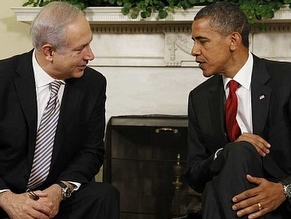|
World Jewish News

Prime Minister Benjamin Netanyahu meeting with U.S. President Barack Obama at the White House on July 6, 2010 Photo by: AP
|
U.S. policy aimed at 'buying time' with Iran, says senior official
28.02.2012, Israel and the World U.S. policy on Iran is aimed at “buying time and continuing to move this problem into the future, and if you can do that - strange things can happen in the interim,” Anthony Blinken, National Security Adviser to Vice President Biden and Deputy Assistant to the President for National Security Affairs, said on Monday.
“You never know,” Blinken added.
Speaking at a briefing organized by the Israeli Policy Forum (IPF) in New York, Blinken also said that the U.S. believes that Iran “has not made a decision to produce a nuclear weapon, they are not on the verge of getting a nuclear weapon, and there is still time and space for diplomacy to work.”
Carefully choosing his words, Blinken said that Israel views a nuclear Iran as “an existential threat” while the U.S. believes that it would pose “a direct and serious threat” to its own security. But, he added, “Israel has to make its own decisions. We are not in the business of telling our allies and partners what to do when it comes to their own national security.”
In a short interview with Haaretz following his briefing, Blinken said that the assessments of Israel and the U.S. on Iran are “very close” to each other, “but because we are in different places, even physically, there may be tactical differences between the two countries – but the fundamental strategic position is the same.”
On the eve of next week’s critical summit between President Obama and Prime Minister Benjamin Netanyahu in Washington, Blinken added that as far as he knows, “Israel has not made any decision about what it might or might not do.” Regarding the controversial statement made last week by the Chairman of the Joint Chiefs of Staff, General Martin Dempsey, that Iran is a “rational country”, Blinken said “you can have big debates about their rationality or lack or rationality, just as there were about the Soviet Union and China. But in the past, Iran has responded to effective pressure.”
In his words to the IPF Forum, Blinken noted U.S. President Barack Obama’s determination to prevent Iran from acquiring nuclear weapons and extolled his “unprecedented support” for Israel. “No president has done so much for Israel and for Israel’s security,” he said.
And he was unusually blunt about the partisan political attacks on the President’s Middle East record: he said what could really harm U.S.-Israeli relations and Israel’s national security is “subjecting either to the vagaries of partisan politics or election year talking points."
“There are individuals on all sides who unfortunately use the debate over policy toward Israel for political purposes, and unfortunately, because of the season that we’re in now, that only gets worse and worse and worse. For generations, Israel has been a bastion of bipartisan consensus – the stakes are too high for us and for Israel to let that change now,” he said. “We can question each other’s judgment – but not each other’s motives.”
He also noted, without explicitly directing his comments at anyone in particular, that “there is a decent chance that the Obama-Biden Administration will be around next November, so folks who are looking how to address these issues should probably factor that in as a reasonable possibility.”
He struck a similar note concerning the “rhetorical drumbeat of war” with Iran, without specifically pointing his finger at the Republican presidential candidates and perhaps other conservative commentators and politicians to whom he was obviously referring. He said that such declarations “play into the hands of the Iranians” by “ratcheting up tensions”, causing oil prices to rise and “money to go into the pockets of the Iranians and out of ours.”
Blinken said that the Administration’s policy of diplomacy backed by tough sanctions is taking its toll on the Iranian economy, which cannot access 70% of its foreign reserves, finds it increasingly difficult to acquire materials for its nuclear industry and is being boycotted by “a list that reads like a ‘Who’s Who’ of leading companies of the world.
Intriguingly, Blinken said that Iranian President Mahmoud Ahmadinejad seems “more interested” in defusing tensions with the West than Iran’s Supreme Leader, Ali Khamenei, whose “raison d’etre is confrontation with the U.S.” At the same time, Blinken admitted that the U.S. has “extraordinarily imperfect information” about the situation inside Iran’s feuding ruling circles.
Regarding Syria, Blinken said that the U.S. currently opposes militarization of the civil war. But he said that the pillars of the Assad regime are disintegrating, with increasing defections from the military and government and business leaders moving their families and their money out of the country.
The well-attended briefing held at the Harvard Club in New York was the latest in a series of similar meeting organized by the Israel Policy Forum, an organization set up after the 1993 Oslo Accords aimed at promoting the peace process and a two-state solution. Its fortunes were so closely tied to the peace process that it almost ceased to function during the Second Intifada. In recent months, however, it is enjoying something of a renaissance, placing itself, as one of its leaders said, “In the middle, between AIPAC and J-Street.”
By Chemi Shalev
Haaretz.com
|
|
